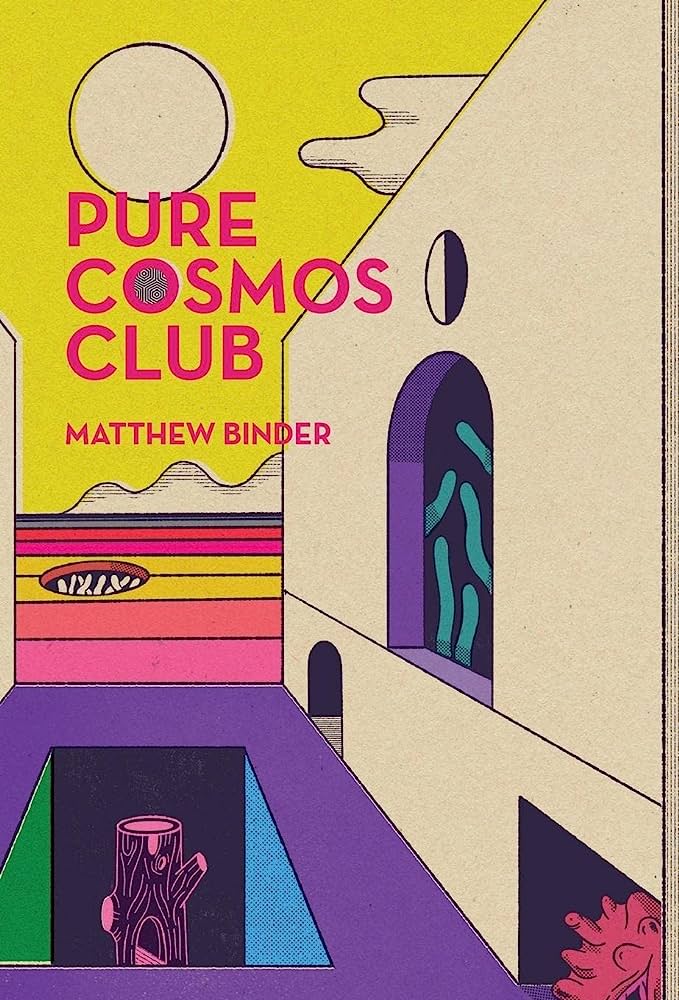
I’ve got a buddy back in Jersey who just bought a house. When I stopped by he was putting in new kitchen appliances and the whole place still smelled like the styrofoam wrap new electronics come in. My buddy is an engineer and makes small but, as I understand it, very fundamental parts for airplanes. He took me out to the backyard and we drank Modelos from the can while his neighbors splashed in a pool. The air smelled delicious. I thought about a rejection email I had received earlier that day and thought: what the hell am I doing with my life?
There’s a similar scene in Matthew Binder’s surreal new novel Pure Cosmos Club, which follows the sweet and strange visual artist Paul. Paul is eking out a shabby living in Brooklyn with his disabled and quiche-loving dog Blanche (the dog, naturally, will eventually become the novel’s moral North Star, but more on that later). But one night Paul dreams that he spent his life working at a plastics factory upstate. At his retirement party at the Owasco Lake Inn, he has three glasses of scotch and takes in the “admiring faces of [his] family and colleagues.” Forty years in the plastics-packaging industry has pushed him along to “this one grand moment.” When Paul wakes up, he’s inconsolable.
“The perfect path was laid out before me,” he says. “All I had to do was take it.”
But that wouldn’t be much of a novel. Instead, and fortunately for us, Paul lives the life of a bohemian. Actually, he seems constitutionally incapable of abiding by convention. He couldn’t have taken that other path. His girlfriend, Jane, leaves him when she discovers he has quit his 9-to-5 to work on his art full-time. At a party, he meets and falls in love with Orsi, a Columbia mathematician. She introduces him to her husband James, the leader of the Pure Cosmos Club cult. Paul, who has a weakness for “fundamentalist orthodoxy,” is drawn in immediately.
The Pure Cosmos Club is transparently ridiculous. It’s part Scientology, part New Age self help and part a “Key to All Mythologies” blend of religious thought. At its core, the Club most resembles a corporate wellness seminar that has broken loose and become a corporation of its own. (The Pure Cosmos Club has a meal plan, but members have to contribute tens of thousands of dollars to be enrolled in it). But here’s the thing: the club might be onto something. James really can do things that are at least miracle-adjacent and Paul’s art improves once he becomes a member. The Club’s ultimate goal, and the reason they need to shake down their followers for cash, is to voyage to space. And if the reader thinks the Club is just an object of mockery, their working spaceship will make her reconsider.
I’m put in mind of Erasmus. When once the Spartans were preparing for war against the Athenians, they consulted the Delphic Oracle. The Oracle’s response, Erasmus reports, was: “Vocatus atque non vocatus, Deus aderit.” In English: “Bidden or unbidden, God is present.” The dictum is closely associated with Carl Jung, who had it carved into his tombstone. Jung wasn’t proselytizing for any specific religion, he explained, but drawing attention to what he believed was a universal fact–humans are spiritual animals, whether they like it or not. Spirituality is an impulse and Paul is doomed to follow this impulse to ridiculous conclusions.
But there aren’t any simple answers here. As the reader learns more about, say, Paul’s unloving father, she might be tempted to say: “Aha! So Paul is seeking a surrogate father in James.” But PCC, to its credit, just isn’t that kind of novel. It’s not a puzzle to be solved and it’s not made heavy by coincidence or the fetishization of meaning. The reader should soak in this book, not dissect it. As strange as this book is, it’s an unlikely beach read.
Binder’s prose captures Paul’s naïveté without mocking him. Actually, in its perverse optimism PCC resembles some of Kafka’s stories, which also follow characters that safeguard their hope against increasingly troubling and bizarre circumstances. And unlike a lot of novels about artists, which take the art-making process for granted, Paul’s process is a serious part of the plot. What changes more than his personality is his art, progressing from paintings of a satanic Gwyneth Paltrow to the work that may make his reputation (and some cash).
The art world, of course, is pilloried. It’s hard to satirize something so ridiculous, with inhabitants that are so venal. Some of the jokes in the relevant sections are like a standup comedian’s jokes that get claps instead of laughs, though there’s a funny bit concerning a mixup between Marc Chagall and the daughter of a chiropractor named Wendy Chagall. The most reliable source of humor is Blanche, who takes care of Paul as much as vice versa. Binder pulls neat tricks with the dog, writing what she is doing while leaving unclear how, exactly, a dog is supposed to be chewing gum or making a painting. We end up with a dog that sometimes “pass[es] out at the dog groomer’s after drinking too much champagne and [wakes] up on the Staten Island ferry.” I missed Blanche tremendously after she moved to Paris.
The last time they talk, the ever-manipulative James tells Paul he can no longer protect him. “It’s up to you now to create your own heaven on Earth,” James says. His words are both condemnation and benediction; isn’t creating heaven on Earth any good artist’s goal?
***
Pure Cosmos Club
by Matthew Binder
Stalking Horse Press; 268 p.
Follow Vol. 1 Brooklyn on Twitter, Facebook, and sign up for our mailing list.
